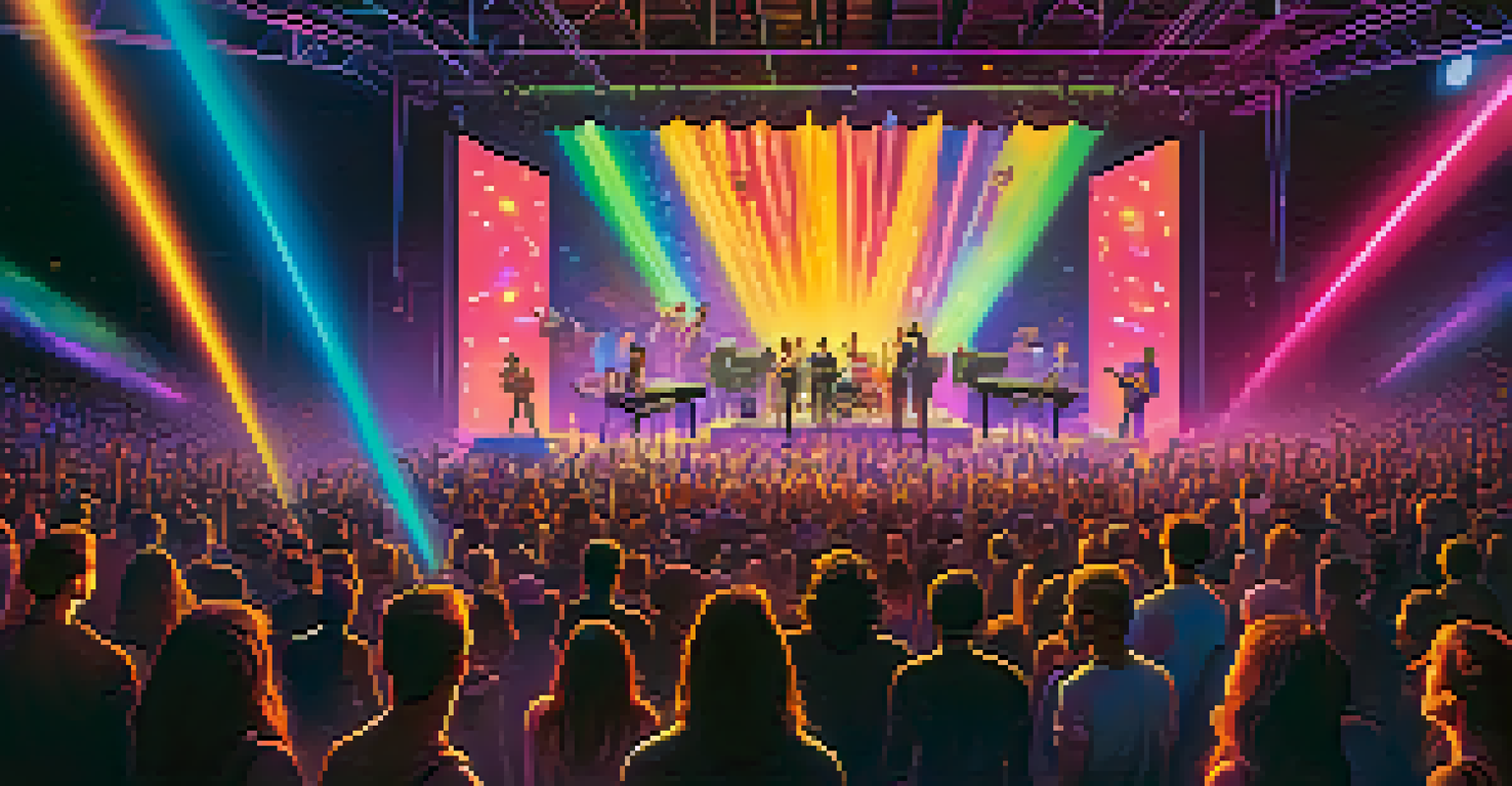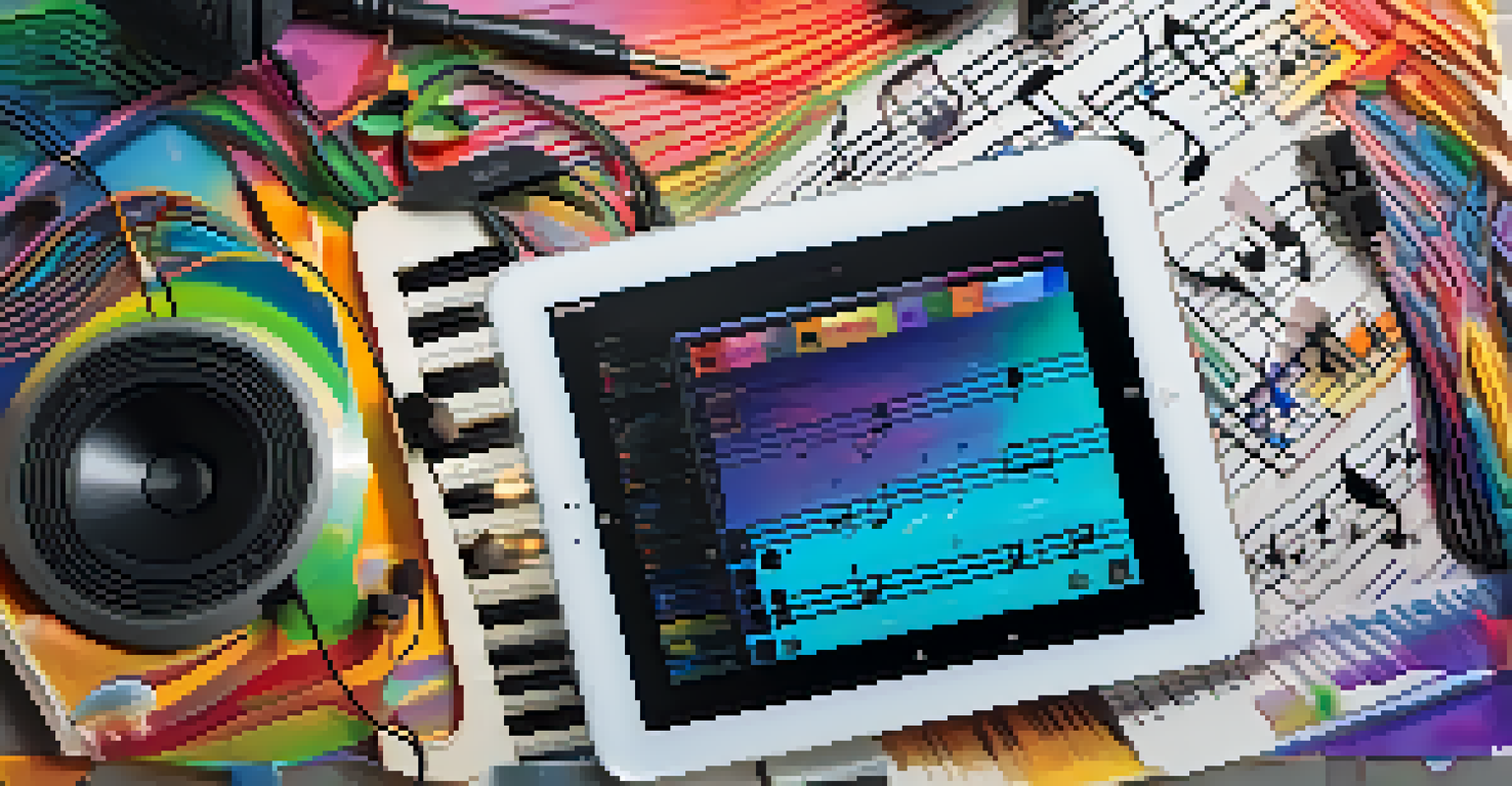NFTs: A New Frontier for Music Royalties and Payments

Understanding NFTs: What Are They and Why Do They Matter?
NFTs, or non-fungible tokens, are unique digital assets that represent ownership of specific items or content on the blockchain. Unlike cryptocurrencies, which are identical and interchangeable, each NFT holds distinct information that makes it one-of-a-kind. This uniqueness is crucial for artists, especially musicians, as it allows them to create verifiable ownership of their work, ensuring they get properly compensated.
The great thing about NFTs is that they allow artists to connect directly with their fans, creating a more personal relationship and new revenue streams.
In the music industry, NFTs can encapsulate everything from album artwork to exclusive concert tickets and even unreleased tracks. This means that artists can sell their music directly to fans without intermediaries, opening up new revenue streams. With the rise of digital consumption, having a way to authenticate and monetize music is more important than ever.
The potential of NFTs lies in their ability to create a direct connection between artists and their audience, bypassing traditional gatekeepers like record labels. This shift not only empowers musicians financially but also fosters a closer relationship with their fan base, cultivating loyalty and engagement.
How NFTs are Changing the Landscape of Music Royalties
Traditionally, music royalties have been a complex web, often leaving artists with a fraction of the revenue generated from their work. With NFTs, artists can set their own terms for royalties, ensuring they receive a fair share every time their music is sold or streamed. This transparency can mitigate disputes over payments and allow musicians to see real-time earnings.

For example, when an artist sells an NFT of a song, they can include smart contracts that dictate how royalties are distributed. Every time that NFT is resold, the artist can automatically receive a percentage of the sale. This innovative approach can significantly enhance an artist's income, providing ongoing financial support.
NFTs Empower Musicians Financially
NFTs provide artists with direct control over their earnings and royalties, eliminating intermediaries and enhancing their financial stability.
Moreover, the decentralized nature of blockchain technology means that these transactions are recorded in an immutable ledger, reducing the risk of fraud. This newfound clarity and security in the royalties process could revolutionize how artists manage their finances and engage with their work.
Benefits of Using NFTs for Musicians and Fans Alike
NFTs bring numerous benefits to both musicians and fans, creating a more interactive and rewarding experience. For artists, NFTs provide a platform to showcase their creativity and control their earnings. Fans, on the other hand, gain access to exclusive content, personalized experiences, and a deeper connection to their favorite artists.
NFTs are revolutionizing the way artists are compensated, ensuring they receive fair payment for their work in an increasingly digital world.
Imagine purchasing an NFT that grants you backstage access to a concert or a unique piece of digital art created by the artist. This not only enhances the fan experience but also creates a sense of ownership and investment in the artist's journey. Fans are more likely to support artists who offer them these unique opportunities.
Additionally, NFTs can foster a community around music, allowing fans to connect with one another and the artists they love. This sense of belonging can lead to increased loyalty and support, making it a win-win situation for everyone involved.
Challenges and Criticisms of NFTs in the Music Industry
While NFTs offer exciting possibilities, they also come with challenges that need to be addressed. One major concern is the environmental impact of blockchain technology, particularly with proof-of-work systems that consume significant energy. This has led to criticisms about the sustainability of NFTs, prompting conversations about more eco-friendly alternatives.
Another challenge is the potential for market saturation. As more artists jump on the NFT bandwagon, the competition could dilute the value of individual NFTs. Musicians may need to find ways to stand out and create truly unique offerings that appeal to fans, rather than simply flooding the market with digital content.
Smart Contracts Enhance Trust
Smart contracts automate royalty distribution and transparently record transactions, fostering trust between artists and fans.
Moreover, the technology is still relatively new, and many artists may feel overwhelmed by the technical aspects of creating and selling NFTs. Education and guidance will be essential for artists looking to navigate this new landscape, ensuring they can take advantage of the opportunities without getting lost in the complexities.
The Role of Smart Contracts in NFT Music Sales
Smart contracts are self-executing contracts with the terms of the agreement directly written into code on the blockchain. For musicians, this means they can automate the distribution of royalties and ensure they receive payment instantly upon a sale. By leveraging smart contracts, artists can reduce the administrative burden and focus more on their craft.
These contracts can be customized to fit the specific needs of the artist. For instance, an artist could set up a smart contract that allocates a percentage of future sales to charity or manages multiple stakeholders involved in a collaboration. This level of flexibility can foster creativity and innovation in music production and distribution.
Furthermore, the transparency offered by smart contracts can enhance trust between artists and fans. With all transactions publicly recorded on the blockchain, fans can see exactly where their money goes, fostering a stronger connection and sense of accountability in the artist-fan relationship.
Future Trends: NFTs and the Evolution of the Music Industry
As the music industry continues to evolve, the role of NFTs is likely to expand and adapt. There’s a growing trend of artists exploring virtual concerts and immersive experiences, where NFTs could serve as tickets or exclusive access passes. This could redefine how fans engage with live music and create new revenue streams for artists.
Moreover, as technology advances, we may see more integrations of NFTs within existing streaming platforms. Imagine a scenario where listeners can purchase limited edition tracks as NFTs while streaming their favorite songs. This could enhance the monetization strategy for artists while providing fans with collectible content.
NFTs Create Unique Fan Experiences
By offering exclusive content and personalized interactions, NFTs strengthen the connection between artists and their audiences.
The potential for collaboration is also immense. Artists can work together to create exclusive NFT collections, combining their fan bases and expanding their reach. This collaborative spirit could lead to exciting new projects and foster a sense of community within the music industry.
Getting Started with NFTs: What Artists Need to Know
For artists interested in venturing into the world of NFTs, the first step is to educate themselves about the technology and platforms available. There are various marketplaces where artists can mint and sell their NFTs, each with its own features, fees, and audience. Finding the right platform that aligns with their brand and goals is crucial.
Artists should also think carefully about the type of content they want to offer as NFTs. Whether it’s music, artwork, or exclusive experiences, the key is to create something that resonates with their audience. Engaging with fans to understand their interests can help inform these decisions and enhance the overall experience.

Lastly, artists should be prepared for the marketing aspect of selling NFTs. Promoting their NFT drops through social media and other channels can help build anticipation and ensure a successful launch. By combining creativity with strategic marketing, artists can make a significant impact in this new frontier of music royalties and payments.